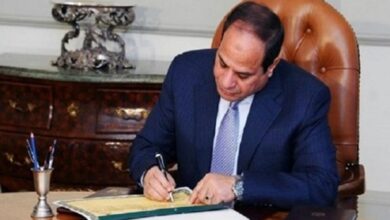An Egyptian rights group on Monday criticized the constitutional amendments recently drafted by the military-appointed committee tasked with the mandate as insufficient guarantees for long-lasting democratic transition.
The reform measures, the Cairo Institute for Human Rights Studies said in a statement, exclude from representation the emergent political and youth forces that unleashed the revolution. They also maintain the legal and constitutional obstacles for meaningful reforms, the rights group alleged.
The amended articles of the 1971 constitution will deny legitimacy to the “forces responsible for igniting the revolution…despite the departure of Mubarak and certain pillars of the former regime,” the statement claimed.
The proposed amendments will keep the “laws that restrict the right of civic association and curtail the free formation of political parties, NGOs, and trade unions,” it added.
The 1971 Constitution was drafted during the tenure of late President Anwar Sadat, permitting the then head of state to acquire a dominant role in the political system, leaving no space for political competition.
The Egyptian Constitution is composed of 211 articles. It has undergone modifications three times–in 1980, 2005 and 2007.
The most recent amendments were also the most controversial. In 2007, political oppositionists accused the former regime of President Hosni Mubarak of paving the road of political succession to Gamal Mubarak, the president's son, through the constitutional reforms.
Egypt’s Supreme Council of the Armed Forces (SCAF), which has been governing the country since Mubarak stepped down on 11 February, opted to suspend the Constitution following the power devolution and form a 10-man committee to amend specific articles of the 1971 Constitution. The committee aims to ensure fair and competitive presidential and parliamentary elections.
The SCAF designated 19 March as the date for a national referendum on the proposed amendments to the constitution's articles 75, 76, 77, 88, 93, 139 and 148, the cancellation of article 179, and the insertion of a paragraph and two items in article 189.
Experts and some opposition figures argue that, should the amendments receive referendum approval, the changes will provide a crucial framework for the next parliamentary and presidential elections. Others, such as political reformist Mohamed ElBaradei, however, are skeptical of the effectiveness of the proposed amendments.
The draft of article 88 which tailored judicial oversight of the elections–a long-held demand by the opposition–allows “the participation of 'judicial bodies' in election oversight rather than limiting supervision to sitting judges. In turn, this allows participation by judicial bodies that do not enjoy full independence,” said CIHRS.
Moreover, the proposed amendments don’t touch article 148, which regulates the declaration of a state of emergency.
“Under the proposed amendment, the president maintains his right to declare a state of emergency with no restrictions on the cases in which he may take this exceptional step," the statement claimed. "These prerogatives go beyond the strict limitations for the declaration of states of emergency established in the International Covenant on Civil and Political rights and the constitutions of many democracies, including those in the developing world.”
The CIHRS also criticized article 75, which conditions presidential candidacies, excluding citizens who carry dual nationalities or citizens who have non-Egyptian spouses.
“This narrow, chauvinistic view of national loyalty is inconsistent with provisions in Egyptian law that uphold the right of Egyptian citizens to dual nationality…This restriction is a grave insult and impeaches the patriotism of an enormous number of Egyptians who gambled on their ability to succeed in free, competitive societies,” said CIHRS.
Such amendments would deny presidential hopeful US-Egyptian scientist Ahmed Zewail, 64, who won the Nobel Prize for physics in 1999, the opportunity to launch a bid for head of state.
Furthermore, CIHRS attacked the draft amendment of article 76, which expounds the methods and conditions for running for presidency as well as the composition of the committee that oversees presidential elections, for designating the chief judge of Egypt’s Supreme Constitutional Court the committee chair.
“Though the chief justice is appointed by the president, it also insulates the commission’s decisions from judicial review, an issue that was under severe criticism during the 2005 presidential elections,” the statement read.
Continuing its verbal assault, the rights watchdog slammed the method of candidate selection.
Under the new draft there would be three methods for candidacy: a presidential hopeful should either be endorsed by 30 members from one of the parliament’s two chambers or both, obtain 30,000 signatures from Egyptians living in 15 provinces or belong to a party that has at least one seat in the People’s Assembly or Shura Council, the two chambers of parliament.
“One unified method should have been specified, preferably the collection of citizens’ signatures, instead of multiple means, which gives unearned status to parties with no real political weight by granting them the right to nominate a presidential candidate if they hold even one seat in the People’s Assembly or Shura Council,” CIHRS concluded.




